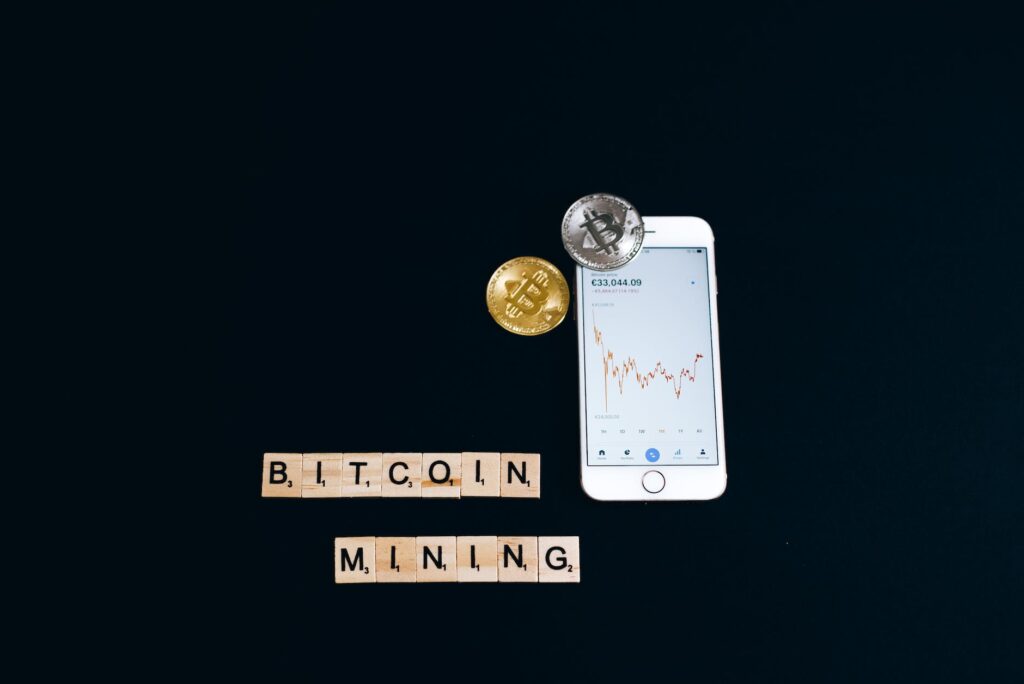Introdução à mineração de Bitcoin
Bitcoin A mineração é um processo fundamental que alimenta a rede Bitcoin e permite a criação de novos bitcoins. Esta secção fornece uma visão geral do que é extração de bitcoin e porque é que desempenha um papel crucial no mundo das criptomoedas.
O que é a mineração de Bitcoin?
A mineração de Bitcoin é o processo de validação e verificação de transacções na rede Bitcoin através da resolução de problemas matemáticos complexos. Os mineradores usam hardware especializado e software para competir uns com os outros na resolução destes puzzles matemáticos. Quando um mineiro resolve um problema com sucesso, adiciona um novo bloco de transacções à cadeia de blocos e é recompensado com um determinado número de bitcoins.
O processo de mineração tem dois objectivos principais. Em primeiro lugar, garante a segurança e a integridade da rede Bitcoin, evitando gastos duplos e transacções fraudulentas. Em segundo lugar, cria novos bitcoins e distribui-os aos mineiros, incentivando assim a sua participação na rede.
Porque é que a mineração de Bitcoin é importante?
A mineração de Bitcoin é de suma importância por várias razões. Em primeiro lugar, é essencial para a segurança e estabilidade da rede Bitcoin. Os mineiros validam as transacções e protegem a rede, garantindo que todas as transacções são legítimas e estão em conformidade com as regras do protocolo Bitcoin.
Em segundo lugar, a extração de bitcoins é o principal método através do qual são introduzidos novos bitcoins em circulação. À medida que os mineiros resolvem com sucesso problemas matemáticos e adicionam novos blocos à cadeia de blocos, são recompensados com bitcoins. Este processo controla a taxa de criação de novos bitcoins, gerindo efetivamente a oferta e a inflação da criptomoeda.
Além disso, a mineração de bitcoin permite que os indivíduos participem da natureza descentralizada da rede Bitcoin. Ao contrário das moedas fiduciárias tradicionais que são controladas pelos bancos centrais, a Bitcoin funciona numa rede peer-to-peer onde nenhuma entidade tem controlo total. A mineração oferece uma oportunidade para os indivíduos contribuírem para a rede e fazerem parte do mecanismo de consenso que governa o sistema.
Em resumo, a mineração de bitcoin é um componente vital do ecossistema Bitcoin. Garante a segurança e a integridade da rede, cria novas bitcoins e permite que os indivíduos participem da natureza descentralizada da criptomoeda. Compreender as noções básicas de como funciona a mineração de bitcoin e a sua importância é crucial para qualquer pessoa interessada no mundo das criptomoedas.
Compreender os princípios básicos
Para embarcar na jornada de mineração de bitcoin, é essencial ter uma sólida compreensão de como o processo funciona e o papel que os mineiros desempenham na rede bitcoin.
Como funciona a mineração de Bitcoin
A mineração de bitcoins é o processo através do qual novos bitcoins são criados e as transacções são verificadas na cadeia de blocos. Envolve a resolução de problemas matemáticos complexos utilizando hardware de computador potente. Estes cálculos servem dois objectivos principais: proteger a rede e adicionar novas transacções à cadeia de blocos.
Os mineiros competem para resolver estes problemas matemáticos, tentando encontrar a solução correta através de um processo denominado prova de trabalho. Este processo envolve o hashing repetido dos dados do bloco até que um padrão específico, conhecido como objetivo, seja alcançado. O mineiro que encontrar a solução primeiro é recompensado com bitcoins recém-criados e taxas de transação.
À medida que mais mineiros participam na rede, a dificuldade dos problemas matemáticos aumenta para manter uma taxa consistente de criação de blocos. Isto garante que não são gerados novos bitcoins demasiado depressa e que a rede permanece segura. O nível de dificuldade é ajustado aproximadamente a cada duas semanas com base no poder computacional total da rede. Pode utilizar um calculadora de mineração de bitcoin para estimar os seus ganhos potenciais com base na sua configuração de exploração mineira.
O papel dos mineiros na rede Bitcoin
Os mineiros desempenham um papel vital na rede bitcoin, assegurando as transacções e mantendo a integridade da cadeia de blocos. Quando uma transação é iniciada, é transmitida para a rede e incluída num conjunto de transacções não confirmadas, conhecido como mempool. Os mineiros recolhem estas transacções e agrupam-nas em blocos.
Quando um mineiro resolve com sucesso o problema matemático e adiciona um novo bloco à cadeia de blocos, as transacções incluídas ficam permanentemente registadas. Este processo garante que todas as transacções são transparentes e não podem ser alteradas retroativamente.
Para além de verificarem as transacções, os mineiros também contribuem para a segurança da rede. À medida que novos blocos são adicionados à cadeia de blocos, tornam-se mais difíceis de modificar, o que faz com que seja extremamente difícil para os agentes maliciosos adulterarem o histórico de transacções.
É importante notar que, à medida que a rede bitcoin cresceu, a potência computacional necessária para a extração aumentou significativamente. Atualmente, as operações de mineração individuais podem ter dificuldade em competir com explorações mineiras de grande escala equipadas com hardware de extração de bitcoin. Como resultado, muitos mineiros optam por aderir a pools de mineração, o que lhes permite combinar os seus recursos e aumentar as suas hipóteses de ganhar recompensas. Para saber mais sobre os pools de mineração, consulte o nosso artigo sobre pools de mineração de bitcoin.
Compreender como funciona a extração de bitcoin e o papel que os mineiros desempenham na rede é um primeiro passo crucial para iniciar a sua própria operação de extração. Na próxima secção, iremos explorar os passos necessários para começar a minerar bitcoin, incluindo a criação de uma carteira, a escolha do hardware de mineração correto e a adesão a um grupo de mineração.
Começando com a mineração de Bitcoin
Para embarcar na emocionante jornada da mineração de Bitcoin, há alguns passos essenciais que você precisa tomar. Esta secção irá guiá-lo através da configuração de uma carteira Bitcoin, escolhendo o hardware de mineração certo e juntando-se a um pool de mineração.
Configurar uma carteira Bitcoin
Antes de começar a minerar, é crucial ter uma carteira de Bitcoin segura e confiável para armazenar seus ganhos. Uma carteira Bitcoin é uma carteira digital que permite enviar, receber e armazenar seus Bitcoins de forma segura. Existem vários tipos de carteiras disponíveis, incluindo carteiras de hardware, carteiras de software e carteiras online.
As carteiras de hardware, como a Ledger Nano S ou a Trezor, oferecem uma camada extra de segurança ao armazenar suas chaves privadas offline. As carteiras de software, como a Electrum ou a Exodus, são instaladas no seu computador ou dispositivo móvel e fornecem acesso conveniente aos seus Bitcoins. As carteiras online, como a Coinbase ou a Blockchain.com, armazenam as suas Bitcoins na nuvem e podem ser acedidas a partir de qualquer dispositivo com ligação à Internet.
Escolha uma carteira que satisfaça as suas necessidades em termos de segurança, acessibilidade e facilidade de utilização. É importante pesquisar e selecionar um fornecedor de carteiras respeitável que tenha um historial comprovado de medidas de segurança. Para mais informações sobre carteiras Bitcoin, pode consultar o nosso artigo sobre carteiras de bitcoin.
Escolher o hardware de exploração mineira correto
O próximo passo é escolher o hardware de mineração correto, uma vez que este desempenha um papel crucial no sucesso da sua operação de mineração. O hardware de mineração de Bitcoin é especialmente concebido para resolver algoritmos matemáticos complexos e extrair novas Bitcoins.
Ao selecionar o hardware de exploração mineira, há alguns factores a considerar:
- Taxa de Hash: A taxa de hash refere-se à velocidade com que uma máquina de mineração pode resolver problemas matemáticos. Taxas de hash mais altas resultam em mais poder de mineração, aumentando as chances de ganhar Bitcoins.
- Eficiência energética: Um hardware de exploração mineira eficiente consome menos eletricidade, garantindo uma maior rentabilidade e minimizando os custos operacionais.
- Custo: O hardware de exploração mineira está disponível em várias gamas de preços. Considere o seu orçamento e calcule o retorno do investimento (ROI) com base na potência de hashing e no consumo de energia do hardware.
Para obter uma estimativa da rentabilidade potencial da sua exploração mineira, pode utilizar um calculadora de mineração de bitcoin. Estas calculadoras têm em conta factores como os custos de eletricidade, a dificuldade de mineração e as especificações de hardware para fornecer uma estimativa dos seus ganhos potenciais.
É importante manter-se atualizado com os últimos avanços em hardware de extração de bitcoin e escolher um fabricante com boa reputação. Pesquise diferentes modelos, leia as opiniões dos utilizadores e compare as especificações para tomar uma decisão informada.
Aderir a um grupo de mineração
A mineração de Bitcoin tornou-se altamente competitiva, e a mineração por si só pode nem sempre ser rentável para os mineiros individuais. Juntar-se a um pool de mineração permite que os mineradores combinem seu poder de computação e trabalhem juntos para minerar Bitcoins de forma mais eficiente. Quando um pool minera com sucesso um novo bloco, as recompensas são distribuídas entre os membros do pool com base no seu poder de hash contribuído.
A adesão a um pool de mineração tem várias vantagens, incluindo:
- Ganhos mais consistentes: Ao reunir recursos, os mineiros recebem pagamentos mais frequentes, proporcionando um fluxo de rendimento estável.
- Variação reduzida: A exploração mineira como parte de um grupo ajuda a reduzir as flutuações nas recompensas de exploração mineira, proporcionando um rendimento mais previsível.
- Acesso a melhor hardware: As pools de mineração têm frequentemente acesso a hardware de mineração mais potente, aumentando as hipóteses de ganhar recompensas.
Existem várias empresas de renome pools de mineração de bitcoin para escolher. Pesquise diferentes pools, considere factores como taxas de pool, métodos de pagamento e tamanho do pool antes de tomar uma decisão. Aderir a um pool de mineração pode melhorar a sua experiência de mineração e aumentar as suas hipóteses de ganhar Bitcoins.
Ao configurar uma carteira Bitcoin, escolher o hardware de mineração correto e juntar-se a um pool de mineração, você estará no caminho certo para começar sua jornada de mineração Bitcoin. O próximo passo é explorar as opções de software de mineração e configurar sua configuração de mineração para otimizar o desempenho e a eficiência.
Software de exploração mineira e configuração
Depois de configurar o seu hardware de mineração de bitcoin, o próximo passo é escolher o software de mineração correto e configurar a sua instalação de mineração para obter o melhor desempenho e eficiência. Nesta secção, iremos explorar o processo de seleção do software de mineração, configurar a sua instalação de mineração e otimizar o desempenho.
Seleção de software de exploração mineira
Antes de começar a minerar bitcoin, é necessário selecionar o software de mineração adequado. O software de mineração actua como uma ponte entre o seu hardware de mineração e a rede bitcoin. Permite-lhe ligar-se à rede, participar na extração e gerir as suas operações de extração.
Ao selecionar o software de exploração mineira, considere factores como a compatibilidade com o seu hardware de exploração mineira, a facilidade de utilização e as funcionalidades que oferece. Algumas opções populares de software de mineração incluem:
- CGMiner: Um software de mineração ASIC/FPGA de código aberto que suporta uma variedade de hardware de mineração.
- BFGMiner: Outro software de mineração de código aberto que suporta vários dispositivos de hardware e oferece recursos avançados para mineradores experientes.
- EasyMiner: Um software de exploração mineira de fácil utilização com uma interface gráfica, adequado para principiantes.
- BitMinter: Um software de mineração baseado em Java que fornece uma interface simples e intuitiva para a mineração de bitcoin.
Antes de tomar uma decisão final, é aconselhável pesquisar e comparar diferentes opções de software de exploração mineira para encontrar a que melhor se adapta às suas necessidades. Também pode consultar o nosso artigo sobre melhor software de extração de bitcoin para mais informações.
Configuração da instalação de mineração
Depois de escolher o software de mineração, o próximo passo é configurar a sua instalação de mineração. Isto envolve a configuração do seu hardware de mineração para funcionar sem problemas com o software de mineração selecionado.
Para configurar a sua instalação de extração mineira, siga estes passos:
- Instale o software de mineração no seu computador ou equipamento de mineração.
- Ligue o seu hardware de exploração mineira ao seu computador ou equipamento utilizando os cabos e ligações adequados.
- Inicie o software de mineração e introduza as definições de configuração necessárias, como o endereço da piscina de mineração e os detalhes da sua conta de mineração.
- Ajuste as definições do software de extração mineira, como a intensidade de extração ou a velocidade da ventoinha, com base nas suas capacidades de hardware e preferências pessoais.
Os passos específicos de configuração podem variar consoante o software de exploração mineira que escolher. É essencial consultar a documentação do software ou os recursos de suporte para obter instruções detalhadas.
Otimização do desempenho e da eficiência
Para maximizar a sua produção mineira e minimizar o consumo de energia, é crucial otimizar o desempenho e a eficiência da sua configuração mineira. Aqui estão algumas dicas para o ajudar a obter melhores resultados:
- Mantenha o seu hardware de exploração mineira limpo e efectue regularmente a manutenção para evitar a acumulação de poeiras e o sobreaquecimento.
- Certifique-se de que o seu hardware de exploração mineira está a funcionar à temperatura e velocidade da ventoinha ideais para um funcionamento eficiente. Consulte as diretrizes do fabricante para obter as definições recomendadas.
- Monitorize regularmente a sua operação mineira para identificar quaisquer problemas ou ineficiências. Utilize software de monitorização ou ferramentas fornecidas pelo seu software de exploração mineira para acompanhar o seu progresso.
- Considere juntar-se a uma pool de mineração para aumentar as suas hipóteses de ganhar recompensas em bitcoin. Os pools de mineração permitem que os mineiros combinem os seus recursos e minem coletivamente, aumentando a probabilidade de encontrar blocos e receber recompensas. Para mais informações, consulte o nosso artigo sobre pools de mineração de bitcoin.
Ao selecionar o software de mineração correto, configurar corretamente a sua instalação de mineração e otimizar o desempenho e a eficiência, pode melhorar a sua experiência de mineração de bitcoin e aumentar as suas hipóteses de sucesso. Mantenha-se informado sobre os últimos desenvolvimentos na tecnologia de mineração de bitcoin e continue a adaptar as suas operações de mineração em conformidade.
Gestão de operações mineiras
Depois de configurar a sua operação de extração de bitcoin, é importante gerir e otimizar eficazmente as suas actividades de extração. Esta secção abordará os principais aspectos da gestão das suas operações de exploração mineira, incluindo a monitorização e o acompanhamento do progresso, a resolução de desafios e a resolução de problemas, e a expansão da sua operação de exploração mineira.
Monitorização e acompanhamento dos progressos
Monitorizar e acompanhar o progresso das suas operações de exploração mineira é essencial para se manter informado sobre o desempenho do seu hardware de exploração mineira e a eficiência geral da sua configuração. Ao monitorizar regularmente as principais métricas, pode tomar decisões informadas e garantir que a sua operação de exploração mineira continua a ser rentável.
Para monitorizar eficazmente as suas actividades mineiras, considere o seguinte:
-
Hashrate: Mantenha-se a par do hashrate produzido pelo seu equipamento de mineração. Esta métrica representa a velocidade a que o seu hardware consegue resolver problemas matemáticos complexos e ganhar recompensas em bitcoin. Monitorizar o seu hashrate ajuda-o a identificar quaisquer quedas no desempenho e a tomar as medidas necessárias para otimizar a eficiência.
-
Estatísticas do pool de mineração: Se faz parte de um grupo de mineração, verifique regularmente as estatísticas fornecidas pelo grupo. Isto inclui métricas como o hashrate total do grupo, a sua contribuição individual de hashrate e as recompensas ganhas. Estas estatísticas podem ajudá-lo a avaliar o seu progresso de mineração dentro do grupo e a comparar o seu desempenho com o de outros mineiros.
-
Calculadora de mineração de Bitcoin: Utilize uma calculadora de mineração de bitcoin para estimar os seus ganhos potenciais com base na sua taxa de hash, custos de eletricidade e outros factores relevantes. Isto pode ajudá-lo a definir expectativas realistas e a avaliar a rentabilidade da sua operação de exploração mineira. Aqui é um exemplo de uma calculadora de mineração de bitcoin.
Lidar com desafios e resolução de problemas
Como em qualquer operação complexa, podem surgir desafios e problemas durante o seu percurso de extração de bitcoin. É importante estar preparado para enfrentar estes desafios de forma eficaz:
-
Falhas de hardware: No caso de falhas ou mau funcionamento do hardware, é crucial ter um plano de backup em vigor. Considere manter peças sobressalentes ou equipamento mineiro de reserva para minimizar o tempo de inatividade e manter a continuidade das suas operações mineiras.
-
Conectividade de rede: As ligações instáveis à Internet podem perturbar as suas actividades mineiras. Assegure uma ligação fiável à Internet e considere opções de reserva, como ligações redundantes à Internet ou fontes de alimentação de reserva, para evitar interrupções.
-
Configuração de software: Ocasionalmente, podem surgir problemas de software, levando a interrupções na exploração mineira. Mantenha-se informado sobre as últimas actualizações e lançamentos do seu software de exploração mineira e resolva prontamente quaisquer problemas relacionados com o software que possam surgir. Aqui é um exemplo de um recurso para selecionar o melhor software de extração de bitcoin.
-
Dificuldade de mineração de Bitcoin: A dificuldade de mineração de Bitcoin é ajustada periodicamente para manter um tempo de geração de blocos consistente. À medida que a dificuldade de mineração aumenta, torna-se mais difícil minerar bitcoin. Mantenha-se atualizado sobre as alterações na dificuldade de extração, uma vez que podem ter um impacto significativo nas suas operações de extração. Aqui é um exemplo de um recurso que explica a dificuldade da extração de bitcoin.
Aumentar a escala da sua operação mineira
À medida que ganha experiência e confiança nas suas actividades de exploração mineira, pode considerar aumentar a sua operação de exploração mineira para aumentar os seus potenciais ganhos. O aumento de escala envolve a expansão do seu hardware de mineração e o aumento da sua capacidade de mineração.
Ao aumentar a escala, considere o seguinte:
-
Equipamento mineiro adicional: Avaliar a opção de adquirir hardware de mineração adicional para aumentar o seu hashrate e poder de mineração. Pesquisar e selecionar o hardware mais adequado equipamento de extração de bitcoin que se adapte ao seu orçamento e às suas necessidades.
-
Infraestrutura de energia e refrigeração: Aumentar a sua operação mineira pode exigir recursos adicionais de energia e refrigeração. Certifique-se de que a sua infraestrutura consegue suportar o aumento da carga e implemente medidas de arrefecimento eficazes para evitar o sobreaquecimento e danos no hardware.
-
Planeamento financeiro: Aumentar a sua operação mineira implica custos adicionais, incluindo despesas de hardware, custos de eletricidade e manutenção. Efectue uma análise financeira exaustiva para garantir que o aumento de escala é financeiramente viável a longo prazo.
Ao gerir eficazmente as suas operações de extração mineira, monitorizar o progresso, enfrentar os desafios e aumentar a escala de forma estratégica, pode otimizar as suas actividades de extração de bitcoin e maximizar os seus potenciais ganhos nesta indústria dinâmica e em evolução.
O futuro da mineração de Bitcoin
À medida que o mundo das criptomoedas continua a evoluir, o mesmo acontece com a prática de mineração de Bitcoin. Nesta secção, iremos explorar o futuro da mineração de Bitcoin, incluindo a evolução da tecnologia de mineração, potenciais desafios e oportunidades e a importância de se manter informado e de se adaptar.
Evolução da tecnologia mineira
A tecnologia de extração de Bitcoin percorreu um longo caminho desde o seu início. Os mineiros estão constantemente à procura de hardware mais eficiente e potente para melhorar as suas operações de mineração. O desenvolvimento de hardware especializado hardware de extração de bitcoin aumentou significativamente o poder computacional, permitindo processos de extração mais rápidos e mais precisos.
Para além dos avanços do hardware, o software de extração também registou melhorias significativas. Os mineiros têm agora uma vasta gama de opções quando se trata de selecionar software de exploração mineiraCada uma com as suas caraterísticas e capacidades únicas. Estas soluções de software ajudam os mineiros a otimizar as suas operações, a monitorizar o seu progresso e a maximizar a sua eficiência mineira.
Com o crescimento da computação em nuvem, alguns mineiros estão também a explorar a opção de mineração de bitcoin na nuvem. Esta abordagem permite que os mineiros aluguem poder de computação a partir de centros de dados remotos, eliminando a necessidade de possuir e manter equipamento de mineração físico. A mineração em nuvem oferece conveniência e escalabilidade, mas é importante avaliar cuidadosamente os custos e riscos associados.
Potenciais desafios e oportunidades
Embora o futuro da mineração de Bitcoin tenha um enorme potencial, também apresenta a sua quota-parte de desafios e oportunidades. Um dos principais desafios é a crescente dificuldade de extração de bitcoin. À medida que mais mineiros se juntam à rede, o nível de dificuldade ajusta-se para manter uma taxa consistente de criação de blocos. Isto significa que os mineiros precisam de atualizar continuamente o seu hardware e melhorar a sua eficiência operacional para se manterem competitivos.
Outro desafio é o consumo de energia associado à extração de Bitcoin. À medida que a rede cresce, os requisitos de energia para a extração também aumentam. Os mineiros estão a explorar formas de tornar as suas operações mais amigas do ambiente, utilizando fontes de energia renováveis e adoptando equipamento de extração eficiente em termos energéticos.
Apesar dos desafios, existem também várias oportunidades para os mineiros no futuro. O potencial de maiores retornos sobre o investimento, especialmente durante períodos de alta nos mercados de criptomoedas, continua a atrair novos participantes para o ecossistema de mineração. Além disso, a comunidade mineira desempenha um papel vital na segurança e estabilidade da rede Bitcoin, o que, por sua vez, apoia o crescimento geral e a adoção de criptomoedas.
Manter-se informado e adaptar-se
Para prosperar no cenário em constante mudança da mineração de Bitcoin, é crucial que os mineiros se mantenham informados e se adaptem aos últimos desenvolvimentos. Manter-se a par das notícias do sector, dos avanços tecnológicos e das alterações regulamentares é essencial para tomar decisões informadas.
A adesão a comunidades em linha, a presença em conferências e a participação em fóruns de mineração podem proporcionar conhecimentos valiosos e oportunidades de trabalho em rede. É também importante rever e analisar regularmente o desempenho da exploração mineira, ajustando as estratégias e o equipamento conforme necessário. Utilizando ferramentas como calculadoras de mineração de bitcoin pode ajudar os mineiros a estimar o seu potencial lucros e tomar decisões informadas.
A mineração de Bitcoin é um campo dinâmico e em evolução. Mantendo-se informados, abraçando os avanços tecnológicos e adaptando-se à paisagem em mudança, os mineiros podem posicionar-se para o sucesso no futuro da mineração de Bitcoin.



